When it comes to Asian teams participating in the World Cup, South Korea holds the pride of place. They have appeared in the tournament more times than any other team on the continent, and their achievement of reaching the semi-finals when co-hosting the tournament in 2002 is the best performance by any Asian team. However, they wouldn’t have fond memories of their first appearance in the finals, as they were defeated 9-0 by Hungary in front of Ferenc Puskas before being beaten 7-0 by Turkey in their second and final group stage match. Nevertheless, since then, they have adapted to life on the biggest stage, and their upcoming trip to Brazil this summer will mark their eighth consecutive participation in the tournament. Below, bestsoccertips will review the 10 best Korean soccer player of all time.
Who is the best South Korean soccer player?
10. Seol Ki-hyeon (2000-09, 83 caps, 19 goals)
As one of the South Korean players to have made a mark in the Premier League in recent years, Seol Ki-hyeon played for Wolverhampton Wanderers, Reading, and Fulham during his time in England.
Before moving to Wolves, this forward carved out a unique place in football history by becoming the first South Korean to score in the Champions League, achieving this feat with Anderlecht. During his time in Belgium, he won a league title and scored a memorable hat-trick within 12 minutes in the Super Cup.
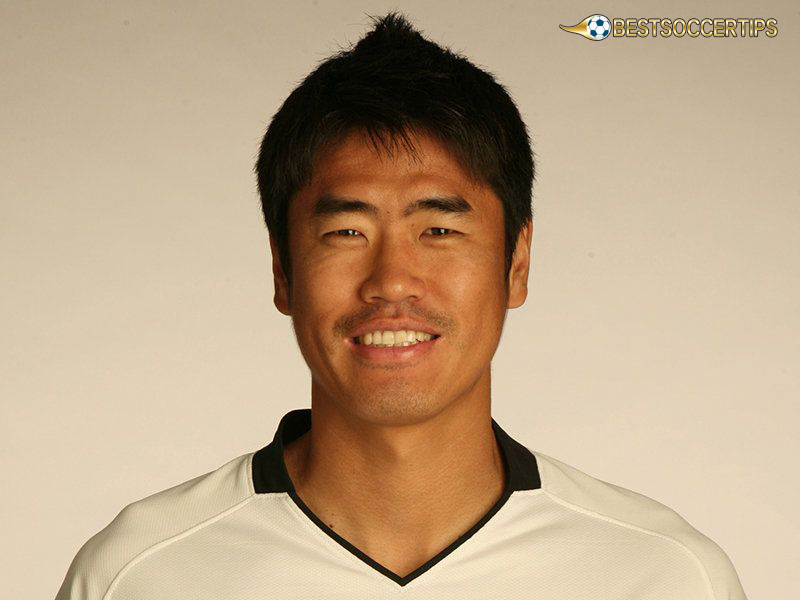
Seol was a crucial factor in his country reaching the semi-finals of the 2002 World Cup, scoring the equalizer against Italy, propelling South Korea to what is considered their greatest moment in sports history. His performance in that tournament was so impressive that he was nominated for the Ballon d’Or in 2002.
9. Choi Soon-ho (1980-91, 94 caps, 30 goals)
Spending the majority of his club career in his homeland, Choi Soon-ho didn’t have many opportunities to shine on the world stage. However, when those chances came, he made the most of them.
At just 18 years old, Choi became the top scorer of the AFC Asian Cup with 7 goals, becoming the youngest player to top the tournament’s goal-scoring charts. However, his finest moment came at the 1986 World Cup, where he scored a memorable goal against defending champions Italy.
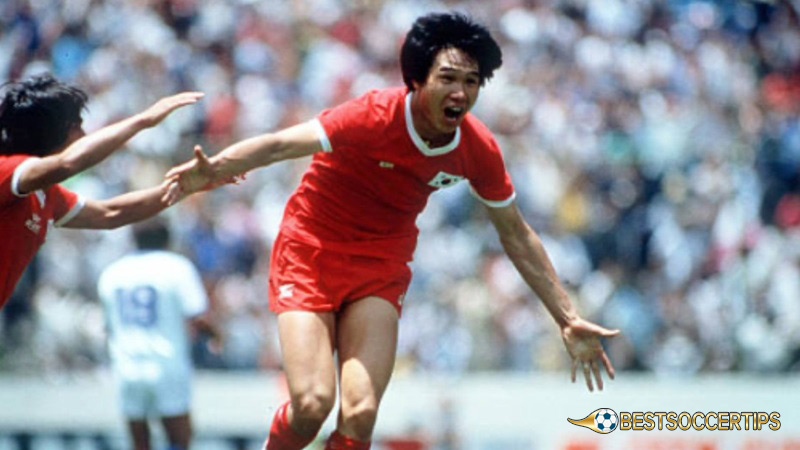
He made 94 appearances and scored 30 goals for the national team, with a peak period in 1985 when he scored 7 goals in just 12 matches. Domestically, he won two K-League titles and finished as a runner-up three times.
8. Lee Dong-gook (1998-present, 99 caps, 30 goals)
If Lee Dong-gook had realized his full potential, he could have caused trouble for the higher-ups on this list. Nicknamed the ‘Lazy Genius’ by fans due to what was perceived as a mismatch between his talent and work rate, Lee was controversially left out of the squad for the 2002 World Cup by Guus Hiddink, who had coached him four years prior, ending as the top scorer of the AFC Asian Cup 2000.
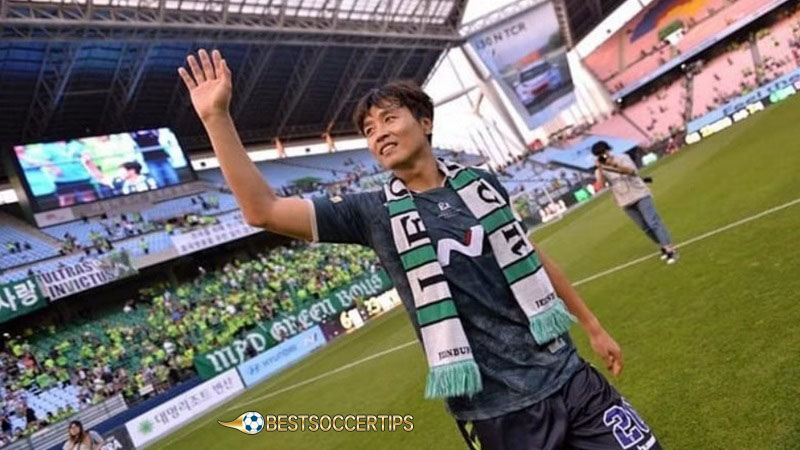
His international career’s ups and downs continued as he missed the 2006 World Cup due to injury and was banned from playing for a year from 2007 to 2008. He eventually made his second appearance at the finals in 2010, though he was no longer a starter.
He spent time at both Werder Bremen and Middlesbrough in his club career, but it was at home where he found the most success. There, he won two K-League titles and Asian club championships, while also being twice honored as the league’s MVP.
7. Kim Joo-sung (1985-96, 77 caps, 14 goals)
Another player who spent time playing in Germany in his club career, Kim Joo-sung had two seasons with Bochum before returning to Daewoo Royals in South Korea. A versatile player capable of playing as a forward, midfielder, or defender, Kim earned 77 caps for the national team over his 11-year career.
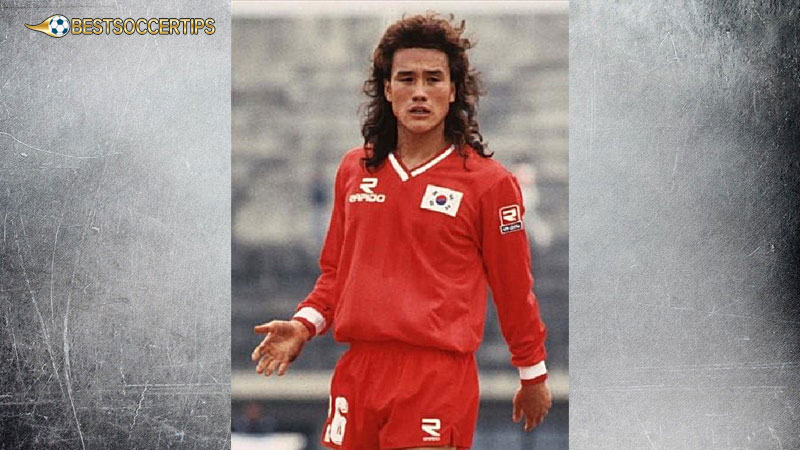
That span included three World Cups and the 1988 Summer Olympics, all featuring Kim. At his peak, he was regarded by many as Asia’s finest player in world football, thus receiving the Asian Footballer of the Year award three consecutive times from 1989 to 1991.
He was twice the MVP of the K-League and was honored as the Best Player in both the Asian Cup and Dynasty Cup in 1988 and 1990, respectively. The International Federation of Football History & Statistics (IFFHS) honored him as the second-best Asian footballer of the 20th century.
6. Hwang Sun-Hong (1988-2002, 103 caps, 50 goals)
Despite being in his 30s when the 2002 World Cup took place, Hwang Sun-hong was still a crucial part of the team that went to the semi-finals. Indeed, he scored the tournament’s opening goal, helping them advance to their first-ever World Cup final.
That goal made him one of the relatively few players to score internationally for half a century, with an impressive ratio of nearly one goal in every two games. Perhaps his most memorable goal came at the 1994 World Cup, where he scored against defending champions Germany.
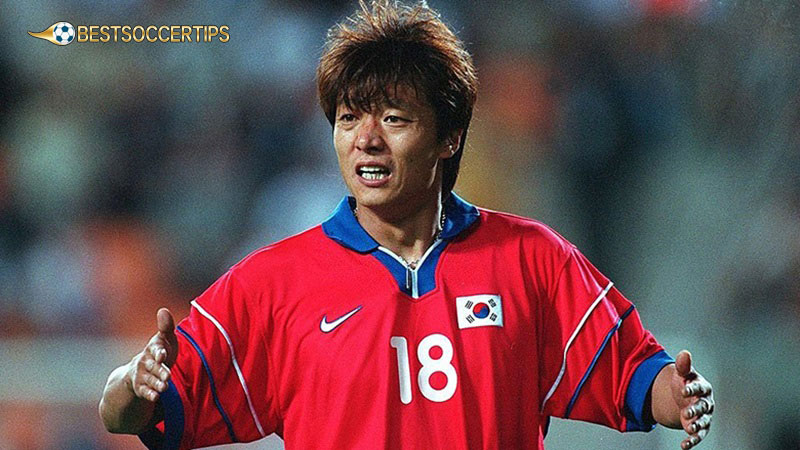
He also scored against both Mexico and Australia at the 2001 Confederations Cup, finishing the tournament as the top scorer. In total, he appeared in three World Cups, missing out on the 1998 tournament due to injury.
5. Lee Young-pyo (1999-2011, 127 caps, 5 goals)
Tottenham Hotspur fans will vividly remember Lee Young-pyo’s three-year stint at White Hart Lane, during which he won the League Cup and made nearly 100 appearances for the club. He was targeted by Roma while still in England but ultimately chose to join Borussia Dortmund in 2008.
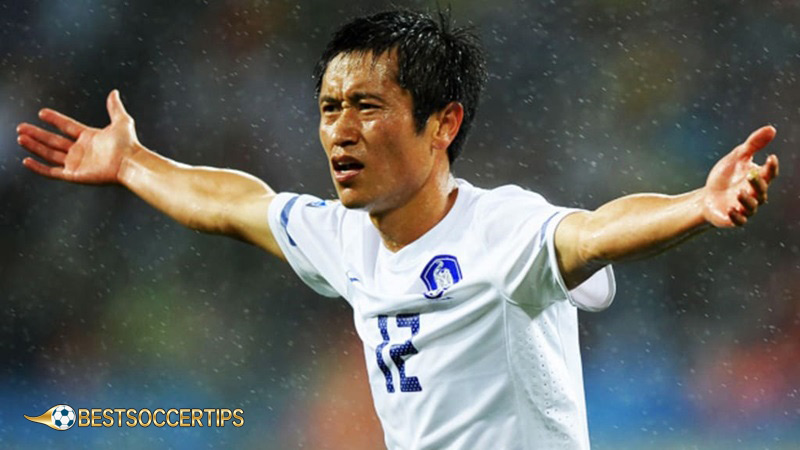
Before his move to North London, Lee won two national titles and a KNVB Cup with PSV under the guidance of Guus Hiddink, who took this left-back to the 2002 World Cup. He impressed at that tournament as South Korea reached the semi-finals before their own fans.
He continued to earn 127 caps for the national team, becoming the third-most capped player in South Korean history before retiring last year after a brief spell with the Vancouver Whitecaps.
4. Lee Woon-jae (1994-2010, 132 caps, 0 goals)
Ranking above Lee Young-pyo in South Korea’s all-time appearances list is Lee Woon-jae, a player many consider the greatest goalkeeper in the country’s history. His tally of 132 caps trails only Hong Myung-bo’s, witnessing him clinch 4 World Cup titles – one of only seven Asian players to reach the final multiple times.
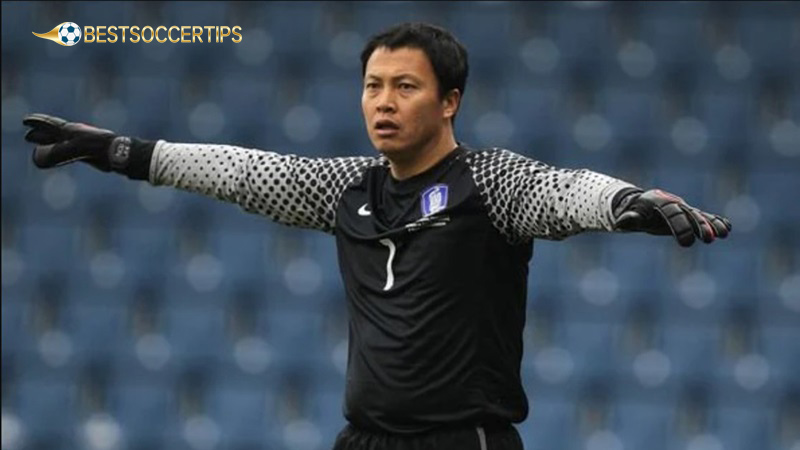
He featured in the 1994, 2006, and 2010 campaigns, but his finest moment came in 2002 when he helped South Korea reach the semi-finals. Lee played a decisive role in the shootout, saving Joaquin’s penalty against Spain to propel his team into the historic final four.
The silverware flowed freely at club level as Lee won 4 K-League titles, 6 domestic cups, and the AFC Champions League 2001-02 with Suwon Bluewings. He was named the tournament’s MVP in 2008 and earned equivalent honors at the Korean FA Cup the following year.
3. Hong Myung-bo (1990-2002, 136 caps, 10 goals)
While there were many heroic performances during South Korea’s remarkable journey to the 2002 World Cup semi-finals, none impressed the Red Devils more than captain Hong Myung-bo. His displays as a center-back earned him a place in the All-Star Team and saw him awarded the Bronze Ball for the tournament – behind only Oliver Kahn and Ronaldo.
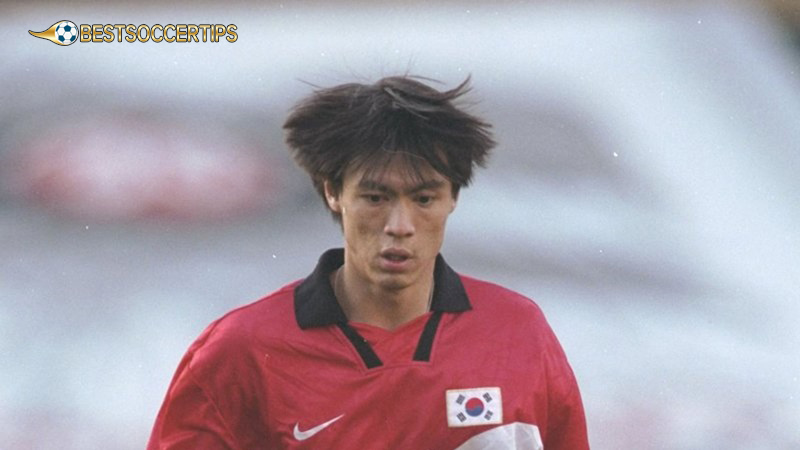
Hong had already made history before a ball was kicked in 2002, becoming the first Asian player to feature in four consecutive World Cups. He also made a significant impact in 1994, scoring one goal and assisting another to help his team stage a memorable comeback to draw 2-2 with Spain before once again providing an assist and scoring in the heartbreaking 3-2 extra-time loss to defending champions Germany.
The most capped player in South Korean history, Hong is also his country’s only representative on FIFA’s 100 list – Pele’s selection of the top 125 living players in 2004. As the current national team coach, Hong will once again be at the World Cup this summer as he aims to lead his team to another memorable performance.
2. Park Ji-sung (2000-2011, 100 caps, 13 goals)
Arguably the most recognizable name on this list for most fans, Park Ji-sung achieved more club success than any other South Korean before him. His seven years at Manchester United saw his stock rise as he made over 200 appearances under Sir Alex Ferguson.
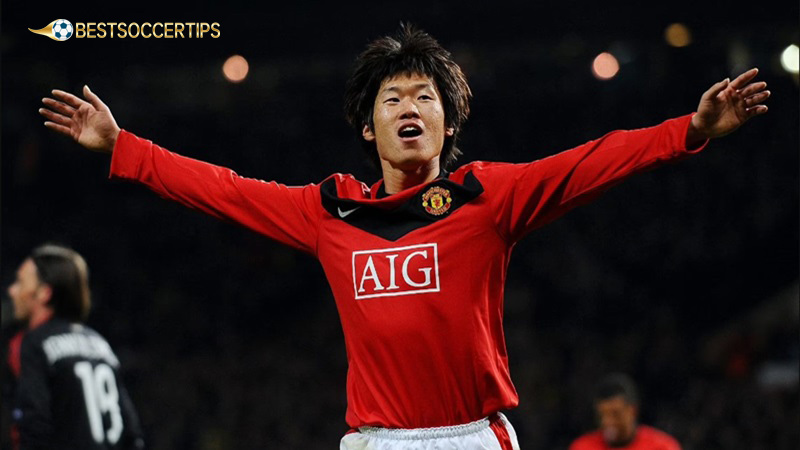
During his time at Old Trafford, he won 4 Premier League titles, 3 League Cups, and 1 Champions League, becoming the first Asian player to win the latter. He also won two Eredivisie titles and a KNVB Cup with PSV Eindhoven, ensuring he retired as Asia’s most decorated player of all time.
His finest international moment came at the 2002 World Cup when he scored the decisive goal against Portugal to take South Korea past the round of 16. He also scored at the 2006 and 2010 tournaments, becoming the first Asian player to score in three consecutive World Cups.
1. Cha Bum-kun (1972-1986, 121 caps, 55 goals)
It was clear from the start that Cha Bum-kun would be a special player for South Korea. As a teenager, this forward became the youngest player ever to don the national team jersey when he debuted in 1972.
He amassed 121 caps and scored 55 goals, a record that still stands atop South Korea’s scoring charts. He also participated in the 1986 World Cup, though his fearsome reputation as a deadly striker preceded him, often attracting two defenders to limit his influence in matches.
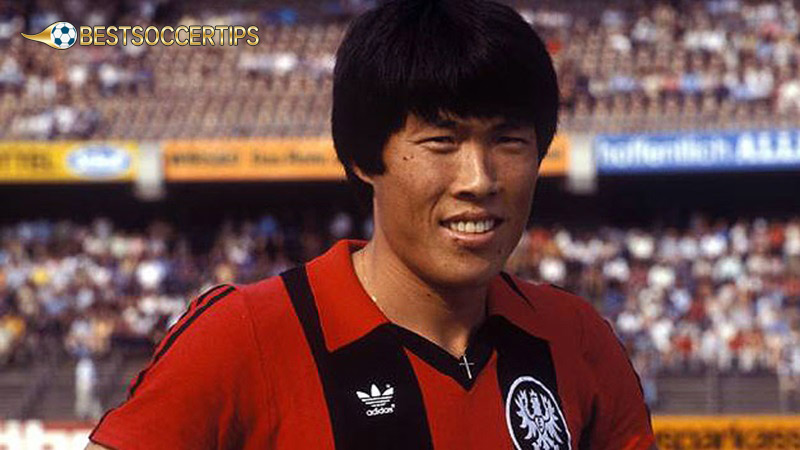
It was at club level where he made the biggest impact. Dubbed ‘Cha Boom’ for his powerful shot, he quickly established himself as one of Europe’s premier forwards after moving to the Bundesliga. In 10 years in Germany, Cha scored 98 goals in 308 appearances, clinching two UEFA Cups and a DFB-Pokal. Personally, the IFFHS honored him as the greatest Asian footballer of the 20th century.
Conclusion
The journey of South Korean soccer has been defined by the excellence of its top players. From Lee Woon-jae’s steadfast presence in goal to the dynamic contributions of Park Ji-sung and the trailblazing feats of Cha Bum-kun, each player has etched their name into the annals of football history. Their collective achievements on the international stage, notably in World Cup tournaments, serve as a source of pride for the nation and a beacon of inspiration for aspiring players. As South Korea continues to build on its soccer legacy, these top players will remain iconic figures whose impact transcends borders, leaving an enduring legacy for generations to come.




